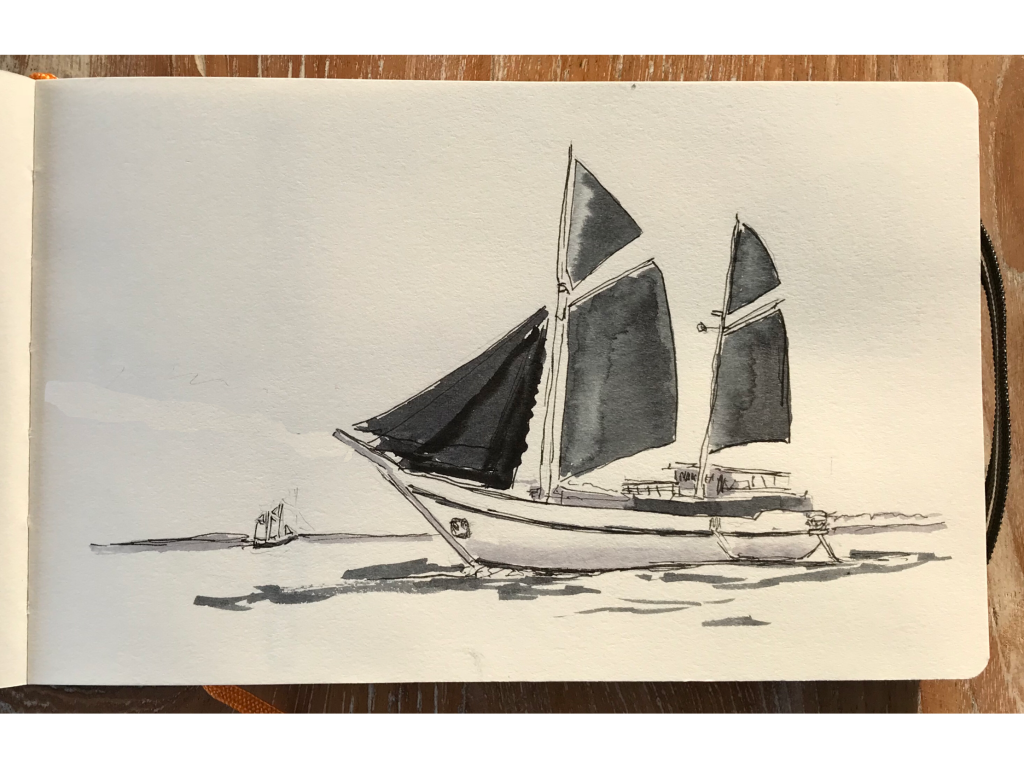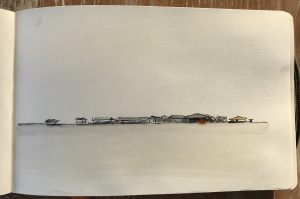December 16, the Cruise, continued
Karsts, Coral Reefs, and Pterographs
Friday, December 8
After dinner the boat undertook a long overnight cruise to the Raja Ampat area of Indonesia, one of the world’s top ecotourism spots. It has karsts that rival anything in China or Vietnam; beautiful reefs; calm waters. We encountered bit of rain, but it wasn’t a big problem.
Pterographs
Water had carved the stone of the karsts in fantastic shapes, and here we could go right up to them in the boat’s tenders, swim right up to them, even under them, where waves had cut away a portion of their bottoms!
Here is a rather rough sketch of one, an unusual one with a keyhole through its top:
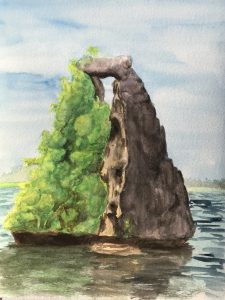
Actually, what I really liked about this one was the large pitcher plant, down near the waterline:
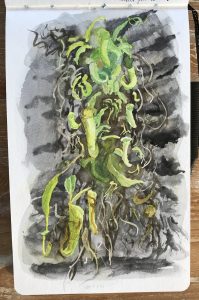
This is a carnivorous plant, sort of like the Venus flytrap back at home. Insects are drawn to the sweet nectar at the bottom of their “pitchers” and die there, to provide nourishment for the plant.
At one point we piled into the tenders and were taken to a karst that had a number of pterographs, what we might call “cave paintings,” except they were in that part of the karst down near the water, in the sheltered underside of it. There were outlines of hands, fish, dolphins, birds, faces, stick figures drawn in red ochre, and reported to be about 7,000 years old. Amazing! Except there were also a couple of modern pieces of graffiti. Disappointing.
We were entertained that night after dinner. The crew appeared with 5 guitars and a drum, singing folk songs that all Indonesians seem to know. People danced, and after the Indonesian music finished, the two of us tried foxtrot to a Tony Bennett, tune, to the amusement of all.
Saturday, December 9
The 6:00 AM sunrise cruise was called off because of overcast sky. We weighed anchor and proceeded to see a karst that was pierced all the way through by a cave.
The Sacred Cave
The company that runs the Ombak Putih pays fees to the government to allow it to visit sites like the one we saw the day before, but in this case, access to the site, the karst mentioned above, is blocked by a Chinese-owned pearl farm, so a spliff was also required.
The pearl farm is industrial looking. There’s a cluster of buildings built on a jetty, surrounded by acres of still water, marked with hundreds of round black bouys, which show the location of the oyster cages. Our tenders had to stop at the jetty to obtain, and pay for, permission.
One thing that relieved the oppressive nature of the location was that our tenders were joined by a pod of bottle-nosed dolphins as we went through the “farm.”
The cave itself carries a sign from the government’s conservation agency, “Sacred Cave” and a list of rules: don’t litter, don’t take anything out, etc. Inside the entrance is a dock of sorts, well, a useless one. Most of us got out of the tender and waded into the cave. It used to be built up, though. There was a platform paved with porcelain tiles and an elevated wooden walkway down to the entrance which from neglect was now rickety and treacherous. My guess is that before the pearl farm was set up, this was a popular tourist spot.
It deserves to be. The cave is beautiful, and swimming through it was an amazing experience. It had an immense, high roof and all kinds of stalactites, though not many -mites, and calm, warm water. It was shaped in a “Y.” We swam down the left branch, and looked out at the forest beyond. The end was blocked with stones. We then turned left and swam out the opening at the other branch, where the tenders came to pick us up.
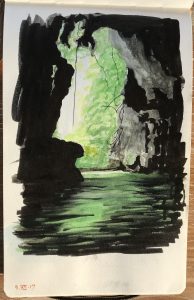
Unfortunately that was the end of our swimming for the day, as a thunderstorm moved in.
Sunday, December 10
Cruised further through the islands of Raja Ampat and did some more snorkeling.
There was an amazing sunset with colors we’ve never seen in clouds before — followed by more rain.
Monday, December 11
The Red Bird of Paradise
We were rousted out of bed at 4:30 so we could make it to the “stomping grounds” of the Red Bird of Paradise before sunrise. Mary decided to sleep in, which turned out to be a wise choice. The morning started out clear, but as soon as we landed on the island it began to rain, and we had a long climb ahead of us, up a steep and mud-slick slope, through the forest, with only a minimum of handrails put up, or steps cut into the slope.
This species of bird of paradise does its courting high up in the canopy, high up on the island. Beneath its chosen spots the locals made clearings, and in one case a platform for us to stand on, made from branches and small trees. Since it was wet and drizzling, only a few males showed up, and put on a desultory performance. One of our compatriots tried to cheer us up by doing a demonstration of his own
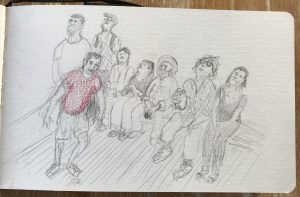
You have to give Jake credit for trying.
Later, the weather cleared and Mary went snorkeling, and came back with great photos. Steve crashed, and did some drawing and painting.
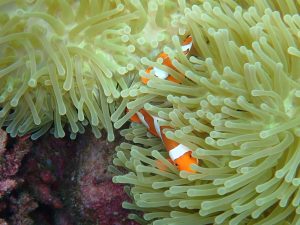
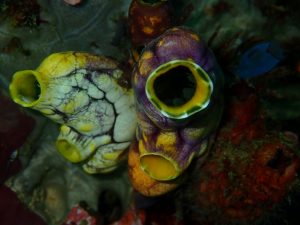
A family of “sea gypsies” arrived at the boat, trading a freshly caught tuna with our captain for some supplies.
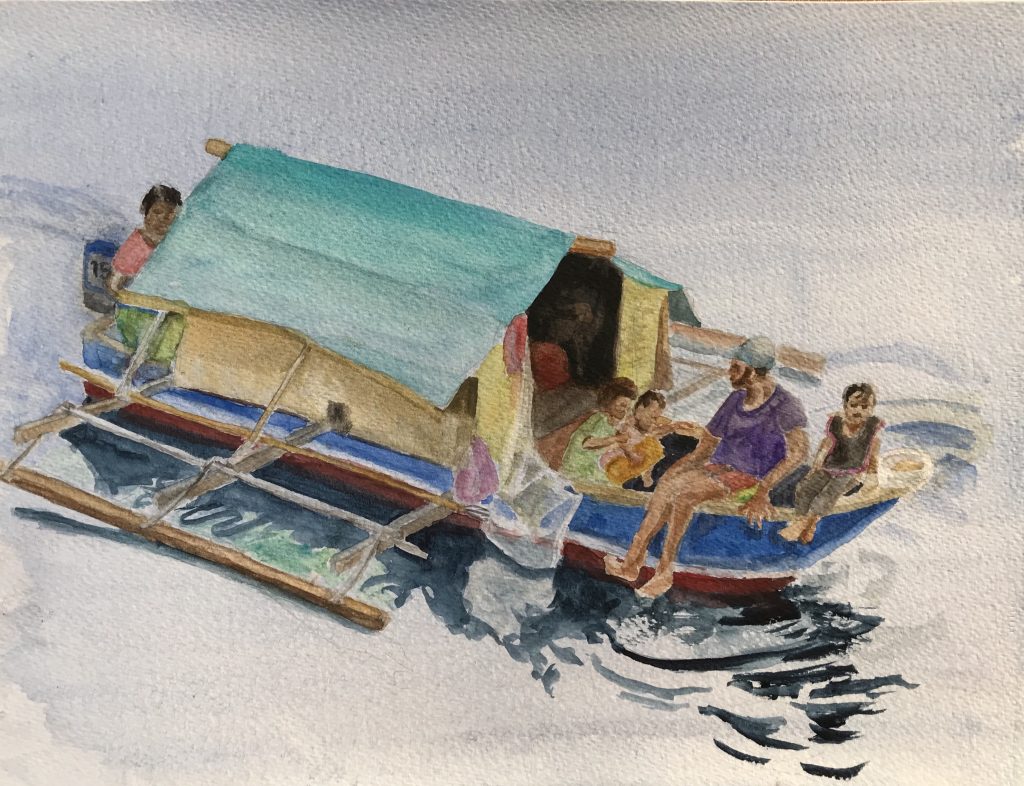
Tuesday, December 12
Our last full day of cruising.
Some of us went out to see the Wallace bird of paradise, getting up at 3:45. It would be a one-hour walk to the site, and only 10 people could fit in the blind. Of those, only 4 could actually see the bird at one time. With the weather so iffy, we decided to sleep in. Turns out the weather held, and they got a good view of the male bird. Oh, well.
Good snorkeling today, and a beautiful sunset.
Fancy last meal, including a tall cone of rice, which Natalie and Jake were the first to cut, since we were celebrating their anniversary. For dessert, a chocolate cake, then singing and dancing with the crew.
At one point in the afternoon, when the weather was just right, the Ombak Putih raised its dark blue sails:
